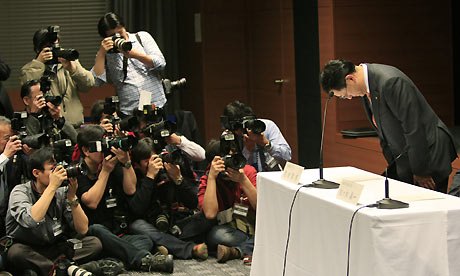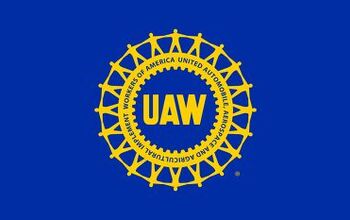Trade War Watch 13: Pedal Politics

Yesterday, a strange love-fest between U.S. Ambassador to Japan John Roos and Japan’s transport minister Seiji Maehara ensued. After their meeting in Tokyo, as reported by the Nikkei, the ambassador and the minister said that everything is hunky-dory, and that Toyota’s recent recalls won’t undermine relations between the U.S.A. and Japan. Which is odd in itself: Since when does a $15 gas pedal get a leading role on the world stage of international politics?
Ambassador Roos effusively told reporters that the recall issue ”in no way has any kind of direct or indirect impact on the strength of the bilateral relationship between the United States and Japan.” Who said it would?
Japan’s transport minister Seiji Maehara likewise said that Toyota’s troubles mean no harm to Japan’s relationship with the U.S.: “The issue shouldn’t damage the two countries’ relationship and shouldn’t hurt free and fair market competition.” Again, why should it?
Strange answers to questions nobody raised.
Kyodo News reiterated this morning in Japan that Toyota’s President Akio Toyoda will travel to the United States in March. Toyota spokeswoman Martha Voss said Toyoda ”would look forward” to the opportunity to meet with members of Congress when he visits the United States. The travel plans of the CEO of a car maker get more attention than a state visit.
There has been an odd amount of highest level governmental involvement with this issue recently, far beyond the regular regulatory ratcheting and the habitual grandstanding. The posturing is solely between the U.S.A, and Japan. Nobody in Europe, or China, which are just as affected by the recalls, turns Toyota into a political issue.
China’s state-owned news agency Xinhua couldn’t help but noticing today: “In a sharp contrast to media reports out of the US, voices of leniency and softened tones have emerged in China on the issue, with some people going as far as highlighting the massive safety recalls as a sign of ‘responsible business operations.'” China is Toyota’s second largest foreign market.
In Europe, where Toyota recalls 1.8m cars, the reaction is even more subdued. The German newspaper Die Welt yesterday cited a spokesperson of the powerful ADAC, Germany’s equivalent of the AAA: “The club does not have any complaints or claims from its members. There is no reason for panic.”
As commentator L’Avventura said: “It seems to me that a lot things are going to happen behind closed doors before the congressional hearings. The question is how it’s going to play out and how much of it is going to be predetermined and politically orchestrated.”
Out of the many possible explanations for the strange behavior, here is one of them:
Prime Minister Yukio Hatoyama had campaigned on a platform that contained moving all U.S. bases off Okinawa, or even out of Japan. The Okinawa issue had received a lot of play in Japan. In the last weeks, it turned quiet.
When U.S. Secretary of State Hillary Clinton complained with her Japanese counterpart Katsuya Okada about alleged discrimination of the Japanese cash for clunker program against American cars, it sounded oddly out of proportion. The number of cars affected wasn’t enough to fill a ship.
Now, the U.S.A. seems to have found a powerful pivot point, and Japan’s undivided attention.
As long as the U.S.A. sits on Okinawa, it doesn’t have to dump a lot of arms into Taiwan, a move that would make China increasingly grumpy. China already threatened to cut Boeing et al out of the Chinese market, after $6.4b of American arms made their way to Taiwan. China is estimated to need more than 3000 airliners worth $400 billion in the 20 years from 2009. Airbus already has the inside track in China and would be more than happy to fill the void.
Nobody claims Toyota doesn’t have problems. As many have said, they have had problems for years. Their problem management is a mess. However, the timing and intensity of the diplomatic activity should give reason for thought.
Implications of a $15 gas pedal …

Bertel Schmitt comes back to journalism after taking a 35 year break in advertising and marketing. He ran and owned advertising agencies in Duesseldorf, Germany, and New York City. Volkswagen A.G. was Bertel's most important corporate account. Schmitt's advertising and marketing career touched many corners of the industry with a special focus on automotive products and services. Since 2004, he lives in Japan and China with his wife <a href="http://www.tomokoandbertel.com"> Tomoko </a>. Bertel Schmitt is a founding board member of the <a href="http://www.offshoresuperseries.com"> Offshore Super Series </a>, an American offshore powerboat racing organization. He is co-owner of the racing team Typhoon.
More by Bertel Schmitt
Latest Car Reviews
Read moreLatest Product Reviews
Read moreRecent Comments
- Dartman EBFlex will soon be able to buy his preferred brand!
- Mebgardner I owned 4 different Z cars beginning with a 1970 model. I could already row'em before buying the first one. They were light, fast, well powered, RWD, good suspenders, and I loved working on them myself when needed. Affordable and great styling, too. On the flip side, parts were expensive and mostly only available in a dealers parts dept. I could live with those same attributes today, but those days are gone long gone. Safety Regulations and Import Regulations, while good things, will not allow for these car attributes at the price point I bought them at.I think I will go shop a GT-R.
- Lou_BC Honda plans on investing 15 billion CAD. It appears that the Ontario government and Federal government will provide tax breaks and infrastructure upgrades to the tune of 5 billion CAD. This will cover all manufacturing including a battery plant. Honda feels they'll save 20% on production costs having it all localized and in house.As @ Analoggrotto pointed out, another brilliant TTAC press release.
- 28-Cars-Later "Its cautious approach, which, along with Toyota’s, was criticized for being too slow, is now proving prescient"A little off topic, but where are these critics today and why aren't they being shamed? Why are their lunkheaded comments being memory holed? 'Who controls the past controls the future. Who controls the present controls the past.' -Orwell, 1984
- Tane94 A CVT is not the kiss of death but Nissan erred in putting CVTs in vehicles that should have had conventional automatics. Glad to see the Murano is FINALLY being redesigned. Nostalgia is great but please drop the Z car -- its ultra-low sales volume does not merit continued production. Redirect the $$$ into small and midsize CUVs/SUVs.



































Comments
Join the conversation
If I get this right, the thesis of this article is that the US government is making a big deal out of Toyota's safety problems because it doesn't want to move the base out of Okinawa. You should rename this a Conspiracy Theory Watch.